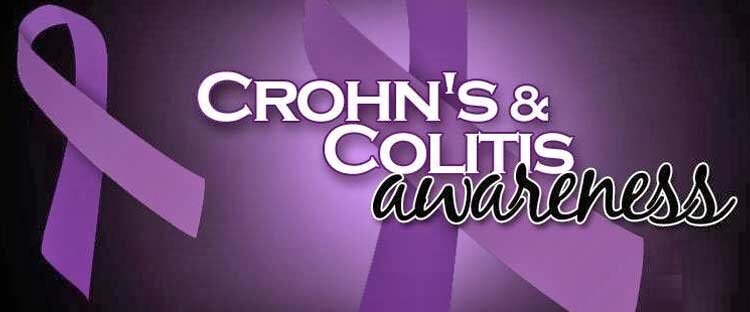
While gastric distress is generally played for laughs on TV and in movies, the truth is that having an Irritable Bowel Disease (IBD) like Crohn’s Disease or Ulcerative Colitis is anything but funny. About 700,000 people in the US suffer from Crohn’s Disease and Ulcerative Colitis; they are often limited in when and how they socialize, they are hypercautious about where they go and what they eat, and many have had serious health scares which can be life threatening.
For IBD Awareness Day (May 19), Mayim spoke to three friends of hers who are living with IBD: Jeff and Gabe were both diagnosed with Crohn’s at 18; and Ramie received her Colitis diagnosis at 21. Read on to see what their lives are like, and to experience their insights and the sense of humor they’ve had to develop over the years to deal with the realities of living with IBD.
Note: IBD is different from the less serious but still medically significant condition called Irritable Bowel Syndrome (IBS); for an explanation of the difference between the two conditions, visit this page at WebMD.
What were your earliest symptoms before your diagnosis?
Ramie: My first flare-up was actually triggered by a major breakup; stress is a huge trigger for these kinds of problems. I had severe rashes from food sensitivities (which I had never had) for a year before my diagnosis that turned into constant stomach troubles: pain, blood in my poop (cue the sexy music…), and a strong increase in appetite. I have never liked going to the doctor so I waited a full month to tell my parents that there was blood in my poop.
Jeff: My earliest symptoms were in high school: extreme stomach pain that would make me double over. I would be unable to eat. I remember I would drink a soda, and I could feel it go down my throat and the instant it hit my stomach, I could feel the pain. For the longest time when I would tell people about it, the typical response was “stress,”, or “you must have eaten something that didn’t agree with you.” I was told I had a nervous stomach or ulcers; or even people saying, “Oh come on; it’s not that bad. Drink some milk.”
Gabe: Weight loss, diarrhea, blood in poop, skin tags and fissures, fatigue, pain in the lower right quadrant of belly.
How long did it take to get your diagnosis?
Jeff: It took a great deal of time for me because apparently you have to really look for Crohns. You have to know you are looking for it, it’s doesn’t just show up as a clear diagnosis. I went through every diagnosis of ulcer, nervous stomach, bad food, etc until I met a doctor in college who was a specialist. And then I was hospitalized the summer break of my freshman year of college. So from the first twinge of pain I had until the proper diagnosis, it was about four years.
Gabe: I started having symptoms while traveling in the Middle East. I thought it was bad shawarma! I went to the doctor upon my return and he said it was probably a bacterial infection I picked up and that it should pass. When things didn’t get better I was scheduled for a series of exams. I was diagnosed about 6 months later on my 18th birthday.
Ramie: It took a few months to be properly diagnosed. I was first misdiagnosed with proctitis by a doctor who didn’t do a full colonoscopy; did a flex-sigmoidoscopy and put me on a pretty low dose of steroids including steroid enemas and suppositories and Cipro, which is a very strong antibiotic.
I was interning at a late night show in NYC and I refused to let anything get in the way. I was determined to hide my illness from my bosses and friends at work. That meant working while on insane doses of steroids, coming in after procedures, and literally pooping in my pants in front of people at work…pretending it didn’t happen and continuing to work. In hindsight it might not have been the best approach, but at the time I just needed to feel like a normal overly ambitious young lady. I didn’t want anyone to feel bad for me because I already felt bad enough for myself.
I was getting sicker and sicker very quickly and I found a new doctor who realized right away that this was more serious than proctitis. He began a far more aggressive treatment and diagnosed that I was having an adverse reaction to the Cipro. He increased my steroids and prescribed an intravenous immunosuppressant called Remicade. Eventually the Remicade effectiveness began to wear off and I started taking a drug called 6mp. 6mp is a very strong drug which gave me horrific nightmares and I felt like I was living in a fog. I became allergic to Remicade and ended up getting medicine-induced Lupus. Four years later, I am now on Entiviyo. I feel great and I am in remission.
People who suffer from IBD often have to have surgeries to correct the problems. How many surgeries have you had and for what?
Jeff: I have had three surgeries: one to remove two-and-a-half feet of my small intestine, and two others to remove scar tissue and obstructions. All three were a slice down the middle of my abdomen and each time I spent about two weeks or so in the hospital followed by a month of recovery. These happened when I was 19, 22, and 25.
Of all the chronic ‘things’ to have, what is it about your diagnosis that feels most impactful? The ‘intimate’ nature of the symptoms and discussing them? People’s misconceptions? Is it something more personal?
Jeff: I would say the most impactful thing for me is looking at every meal – every bit of food – as a potential threat; a truly dangerous threat. The threat holds so many possibilities: pain, hospital, money, as well as – and this is the worst for me personally – being confined to the bathroom for the night if my stomach reacts poorly to something. That part is highly emotional for me, as it hurts both physically and emotionally and psychologically. It makes me feel vulnerable and helpless and weak. Also, with that kind of reaction, I know I won’t sleep much and for me, there are few things worse than being so tired but your body won’t let you sleep because it (thankfully I suppose) signals you to get up and (very often) RUN to the bathroom.
I think the misconception is maybe that if you have Crohn’s (or Colitis) you just have to poop all of the time (which you do) but a lot of people don’t realize the difference between, “I have to poop” and “If I don’t leave this location right this second, there will be an embarrassing disaster.”
Gabe: The most impactful element of my diagnosis was realizing at a young age that I was not invincible and that this was something I was going to have to deal with for the rest of my life. The diagnosis changed the course of my life and prevented me from pursuing certain goals that I had had as a kid (such as serving in the military in a combat unit). It was the first time in my life people started telling me “no,” or that I couldn’t do things or that I wasn’t good enough or up to a certain standard. It took me a long time to separate my identity from my illness and come to understand that I was not defined by my disease; rather, it was simply a small part of the whole me.
Ramie: The most impactful part of the last 5 years has not been how other people view me and my illness, but more how I learned to view myself as a ‘sick person.’ It took me a long time to cut myself slack and treat my body generously in order to best heal.
It is in my nature is to take care of others, so learning to let my friends and family step in has been really hard. Learning to ask for help has been even harder. I am immeasurably blessed to have a selfless mother who spent a full year commuting from my hometown of Cleveland to New York City every few weeks to take me to doctor’s appointments. I think this whole ordeal has been harder on my parents than on me. I can’t imagine how painful it is to have a sick kid and not be able to assuage their physical and emotional pain.
My social life was hugely impacted. My friends went out to bars all the time and I could no longer drink. House parties were terrifying. If the bathroom was in use when I needed it I was in BIG trouble. And you can forget public transportation! Not having immediate access to a bathroom was not a risk I could take. I was a hermit for months.
My boyfriend at the time wanted to go on dates. I couldn’t leave my apartment because I didn’t know where the nearest toilet would be. Gaining 30 pounds from steroids, losing control of my body, and generally feeling bad about the unsexiness of poop problems ruined that relationship. I hated my body and couldn’t let someone else love it or embrace it. I still have a very complicated relationship with my body, not that most people don’t, but sometimes I feel like I am living in someone else’s body.
What does it mean to you to have a chronic condition?
Jeff: Chronic, in this regard means, time-consuming. LITERALLY consuming my time, my life, my hours on this planet. So much of my life past the age of 20 has been spent dealing (and in some cases not dealing) with this. From treatment to planning any and every route of a day out to make sure I don’t get in a jam. Time-murdering if I’m being dramatic; and frankly I’m not. That’s how it feels to me: what a waste.
Gabe: Chronic means something I’m going to have to manage long term, just like a lot of things such as finances, relationships, and career choices.
Ramie: To me the word chronic means that unfortunately I can’t live like everyone around me. It means having to accept and own the fact that I am sick, which took me years of therapy. Many autoimmune diseases are “invisible.” This means that the man or woman standing behind you at the grocery store could be in agony and you would have no idea. A few days after I was diagnosed with Lupus I was sitting on the subway. After a few stops an older woman got on the train and I desperately wanted to give her my seat, but I couldn’t stand up. I had to take the elevator down to the platform because my knees simply couldn’t handle stairs. I spent the rest of that train ride thinking people were judging me for not giving up my seat. I also realized that every time I judge a situation, there might be something I can’t see, just like my illness can’t be seen.
Chronic means remembering that the medicine keeps me healthy and that if I go off of them I WILL get sick. When I feel good it’s easy to think I am cured or in remission and do something like eat inflammatory foods, push my body too far, or go off my meds without asking (I’ve made many better decisions). I quickly remember that the only reason I feel good is because of the meds and I need to respect that. It only takes a moment to get sick and can take months to get back to a good place.
Chronic means listening to my body and being responsible. I need more sleep than I used to. If I feel tired, I don’t need to push myself to go out anymore. If my joints hurt, I it’s okay to skip the gym (well, I might be too generous on that one…).
What is your daily regimen? Do you take medication? Eat a certain way? Avoid certain things?
Ramie: I get infusions intravenously every 8 weeks. Eating well, drinking lots of water, and getting enough sleep make a world of a difference. Cutting out sugar (a major inflammatory food) was the best thing I did for my body. I’m not great at keeping it up, but I’m trying to be better. I stick to the same foods that I know work for me and avoid foods like popcorn, nuts, dairy, some meats, excessive fruit and raw vegetables. Alcohol is horrible for me but I can’t resist a good glass of bourbon once in a while.
Jeff: My daily regimen varies, and that’s what they don’t tell you at first when you get diagnosed: it’s a process. I’ve noticed that they now hand out the same exact piece of paper with the list of things to eat and things to avoid as when I was first treated almost 30 years ago. You have to find out for yourself what you can and can not eat, although there are certainly things that are pretty universal to avoid such as raw veggies, hard to digest meats, and too much fiber. The goal generally is low fiber and very high protein because your body doesn’t absorb protein and iron like other people do. I’m fairly lucky I don’t currently take any medicine; occasionally I’ll take a steroid if I have a flare-up. There have been great advances in managing Crohn’s since I was diagnosed. It used to be a cocktail of drugs every three hours. And yes, on the rarest occasion when dealing with Crohn’s, you do not give a fuck or you are so damn tired of all of it that you just eat whatever the hell you want and pray.
Gabe: I take 100 mg of the drug 6MP every morning, which has worked like a charm for me. I am currently in complete remission and have no physical or food restrictions other than the ones I impose on myself. Staying fit and healthy is important to me so eating well, getting exercise, and getting enough sleep is a priority, which I’m sure has helped my Crohn’s in addition to improving my overall wellness.
Are there alternative or holistic things you have found work for your symptoms? What are they?
Jeff: I have been woefully ignorant and or stubborn about holistic and alternative treatments aside from meditation and peace and yoga and just managing my general malaise. I’ve heard great things can come from alternative stuff – they all claim they can fix me, but it’s kind of like when you say you have a cold and everyone says, “I know what you should take for it…”
Ramie: I had a really good experience with NAET treatments (Nambudripad’s Allergy Elimination Techniques, a non-invasive, drug-free, natural solution to alleviate allergies of all types and intensities). I couldn’t believe NAET worked until it worked for me. I was able to eat a lot of the foods I had not been able to eat in years because of sensitivities. I went through a major kudzu root phase. I boiled it in a glass pot and drank it with either honey or miso. I found that to be healing.
Do you think about your diagnosis/condition daily and what is that like?
Jeff: I don’t really think about it daily. When it was the worst it ever was, every day was a struggle and I was fearful and it was painful in so many ways. Now, I certainly have my days, but for the most part I just go along with life which of course is sometimes harder than thinking about it every day because the reminders that I have can be startling and harsh. That being said, events of any kind produce a sort of anxiety: anything where I might have to interrupt what’s happening if I need to get to a bathroom such as being in a crowded movie theater or any sort of gathering at a house, car trips, or even going to the gym.
Gabe: No, but when I have the occasional flare-up it does get me down. It’s a reminder that there is this process taking place in my body that is working against me and at those moments I re-center myself and accept that this is simply part of my life.
Ramie: I think about it every day because I am constantly asking myself if how I feel is ‘normal’ or something serious. If my stomach makes a strange noise, or if my knees hurt, or if I have cramps, I have to pay attention to my body; I can’t let things like that go. Because stress is a major trigger I have to manage my stress differently than I used to. There is no pretending something isn’t upsetting me or making me anxious, my body tells me right away.
Having to think about being sick everyday used to be devastating. I just wanted to be normal. I’ve learned to live with it and now this is just one of that many parts that make me who I am… it’s not even the most complicated part anymore.
What is the one thing you want people to know about your diagnosis and how it affects you?
Jeff: If I cancel plans or flake on something or if I suddenly have to leave a place, it’s not because I’m “having a little tummy thing.” If I leave somewhere or cancel plans, it’s not that I don’t want to be there. It was dire. Dire. I’m hurting. I’m scared. I’m probably pissed off that I have to leave. Because more often than not I would rather be doing whatever I was doing than doing what I will be doing once I get home long after you’ve gone to sleep.
Gabe: Don’t let people tell you what you can and can’t do. One must find his or her own limits, explore and push them, and create the life and lifestyle you want. My diagnosis doesn’t define me and though I did not have a choice in the matter I do have a choice of how I am going to live every day.
Ramie: I want people to know that this disease has made me stronger, not weaker. Living a somewhat normal life with this insane disease is a challenge every day. I don’t want people to feel bad for me, I can’t handle that. I also want them to know while I appreciate the help, sometimes I just need to be alone.
What is a fear you have about this aspect of your life?
Jeff: The hardest thing for me that I have fear about is the murdering time aspect. To paint a picture: when I am sitting on a toilet for hours and hours with my ass and legs going numb on some occasions, I’m thinking about how the rest of the world is out enjoying Epicurean delights and a lavish good time. And there is laughter and flirting and romance and entertainment and this hardcore truth sits with me. I just think, “This will never end. I am missing out on life.” And that’s the fear – the really human fear – that this is what you are and who you will remain. I’m “the person who didn’t get to do anything.” I know that sounds dramatic and it’s probably not entirely accurate. But in those moments, that’s what it is: an exhausting, draining, painful, emotional and physical solitude.
Do people have it worse? Without a doubt, yes. But in those moments, it’s hard for me to imagine it. I used to wonder why people who have had their intestines removed and replaced by a colostomy bag always said it was the “best thing that ever happened to me,” because that sounded insane and disgusting to me in my youth. It seemed like it would be the end of the world – a bag that you poop in and carry around with you? No thank you! Now, I understand: it’s an end to suffering. I certainly do not want it. But I certainly understand it.
Ramie: I am afraid that I will give this disease to my kids. I’m afraid people will see me as weak or that I might see myself that way. I am afraid that someone won’t want to sign up for a life with a ‘sick person.’ I am afraid that if this medication fails I will be out of options. I am afraid every time I have to tell a new boss or friend about my disease.
Gabe: I know that, long term, there are potential serious side-effects to my meds, even though the chances are slim. That is always in the back of my head.
Are there any ‘upsides’ to this?
Jeff: I guess the stomach being the core of your emotions has a truth to it for me. My stomach has been kicked around but because of it, I have an emotional opening. I get to FEEL everything. So upside #1: I have tremendous empathy for anyone in pain. Pure compassion to anyone suffering. A visceral reaction to anyone in physical or emotional pain – I literally can feel their pain. Although it is sometimes hard to be so in touch with others’ pain, my Crohn’s reminds me often that I am NOT missing anything in life; I’m experiencing it all.
Upside #2: Years ago I found myself outside of a bathroom in an LA gas station. There was someone in the bathroom and it was clear I was not going to get to use this bathroom when I needed to. So I got back in my car and drove for a while, clenching my body and sweating; ashamed, low low low… And at some point – we can call it the point of no return – I just let go of the whole thing. I just said to myself “This is happening…” I let everything come over me: emotions, the stories I’ve told myself about myself, the lambasting of myself for being 41 years old and having just shit myself like a two year old. It was a lot of awful stuff. However. I didn’t resist it. I just stayed there inside myself mentally and felt every bit of it. And magically or not, there was a figurative release. This weird peace came over me. This situation wasn’t pleasant: I still had to get out of my car, get up the stairs, and into my apartment shower all the while praying that no one saw me… but the feeling of “This just is” was very powerful. Nothing else: just this. And I laughed and cried, and I laughed some more and then couldn’t really tell the difference. Acceptance. Not resignation, but absolutely non-resistant acceptance.
Gabe: I’ve come closer to the understanding that all things are impermanent and that we are here – alive – for a short period of time. We don’t know how long we’ll be around, so we should make the most of our time. This notion of impermanence is humbling and comforting to me – it takes me out of my own self-pity and suffering when I don’t feel good and reminds me that I am just a small piece of a much bigger puzzle.
Ramie: I have always loved poop jokes and now no one has the heart to tell me to stop. One upside to people feeling bad for you, I guess.
My illness is a huge part of what led me to become a Rabbi. Helping others navigate illness and talk about faith in the face of pain is something that might not have called to me the same way had I not gotten sick.
I don’t know if gratitude is an upside but I am immensely grateful for very simple things. I don’t think most people in their 20’s actively feel grateful when they are able to climb a staircase.
In Judaism there is a special blessing one makes after using the bathroom, thanking God for allowing things to run the way they are supposed to. It wasn’t easy saying that while I was sick and things weren’t working right. I don’t know that I have missed saying it once since. Knowing what happens when your body doesn’t work makes you grateful every time it does work. Whoever would have thought something as silly as a poop could be miraculous.
——
For more information about symptoms, treatments and diagnoses, please visit the following links:
From CrohnsandColitis.com: “What is Crohn’s Disease?” and “What is Colitis?”




 Read More From Mayim
Read More From Mayim
Grok Nation Comment Policy
We welcome thoughtful, grokky comments—keep your negativity and spam to yourself. Please read our Comment Policy before commenting.